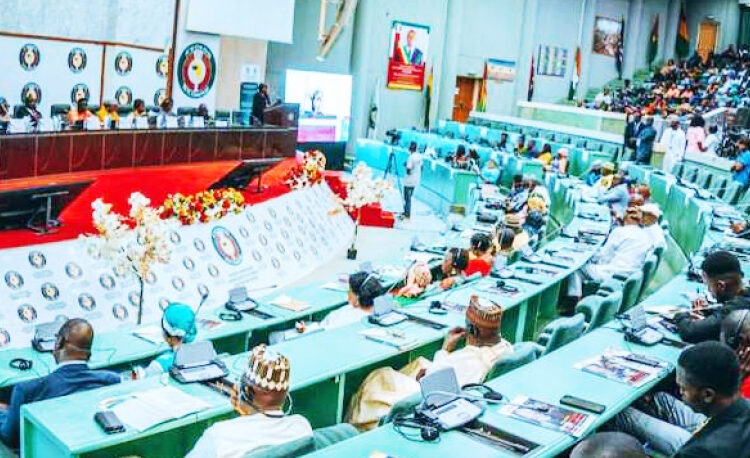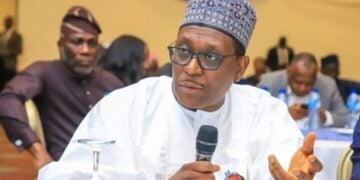Ministers of member states of the Economic Community of West African States (ECOWAS) have renewed calls for increased priorities in the areas of trade, investment and industrial development to save the region from dependency on foreign interests.
Nigeria’s minister of foreign affairs, Yusuf Tuggar, led discussions on these critical sectors during the opening of the 94th Ordinary Session of ECOWAS Council of Ministers in Abuja on Thursday.
Tuggar, who is the chairman of the ECOWAS Council of Ministers in his address stressed that member states must consolidate the shared ideals of regional integration and sustainable development within the community.
He said, “For newly independent African countries, if you stay alone and isolated from your neighbours, you remain dependent on the former colonial master, forever consigning yourself to being an exporter of agricultural cash crops and raw materials to the metropolis.
“Conversely, if you trade freely with your neighbours, develop infrastructure jointly to strengthen the trade, you develop indigenous industries, collective self-reliance and take control of your destinies.
“Given that we have a youthful population, I feel it has become necessary, whenever the opportunity arises, to remind ourselves that ECOWAS and Regional Integration in Africa was borne out of our yearning for economic decolonization and not the other way round.”
The Council of Ministers during the meeting reflected on a wide range of reports and proposals, concentrating on thematic and sectoral matters that are central to the development and stability of the region. These include critical issues related to economic integration, infrastructure development, health, education, agriculture and manifold institutional matters aimed at strengthening our Community.
Ambassador Tuggar reiterated that the West Africa Economic Summit (WAES) that will be held in Abuja from Friday 20 to Saturday of 21 June 2025 will unlock the massive investment opportunities abound in West Africa.
“The event seeks to reaffirm the role of private enterprise as a Bonafide development partner. It will draw participants from the private and public sectors; policy makers, national and regional regulatory agencies, domestic and international investors, Development Financial Institutions, banks and startups. It will showcase young artists from across the region,” he added.
President of the ECOWAS Commission, Omar Touray in his address said ECOWAS institutions have continued to pursue their various mandates for the integration and development. He pointed out that various memoranda will be presented relating to the progress made in the promotion of regional integration and development.
“We shall be presenting you with the outcome of the Joint Meeting of ECOWAS Ministers of Trade and Industry, who met to examine and validate the key regional instruments, as well as discuss the regional and continental issues relating to trade, industry and investment promotion.
“Specifically, the ministers examined the question of Non-Tariff Barriers (NTBs) within the framework of the ECOWAS Trade Liberalisation Scheme (ETLS) and the AfCFTA,” he said.
He lamented that despite numerous initiatives, including the Presidential Tasks Force on Trade Liberation Scheme, the problem of non-tariff barriers as perennial obstacles to boosting regional trade, investment, industrialisation, competitiveness and economic growth of the region persists.
“We must do everything to put an end to this and facilitate economic exchange across the region,” he added.
He noted further that the Ministers of Trade and Industry have considered the Cooperation Agreement between ERCA and Member States on the implementation of Competition and Consumer Protection Rules within ECOWAS and requested Member States to take necessary measures for its signature by the end of June 2025.
The ministers also approved the Trade and Investment Promotion Strategy and urged member states to accelerate the ratification of the WTO Fisheries Subsidy Agreement and the AfCFTA.
With regard to our Inter-regional and international trade, the Ministers also reviewed the West Africa – European Union Economic Partnership Agreement (WA-EU EPA) and recommended further national consultation with key stakeholders, in particular the private sector to propose a way forward.
Touray noted the issues of standards and mutual recognition of inspection certificates are critical to both regional trade and industrialization, adding that progress has been made regarding the industry Standards Harmonisation Model (ECOSHAM) document, the revised ECOWAS Quality Infrastructure Scheme document, the mutual recognition agreement for inspection certificates, and the fifty-eight (58) ECOWAS standards.
On the issue of security and political stability, Touray noted that the Ministers have secured an understanding with Burkina Faso, Mali and Niger on the need to work together to build confidence to collectively confront terrorism and violent extremism.





